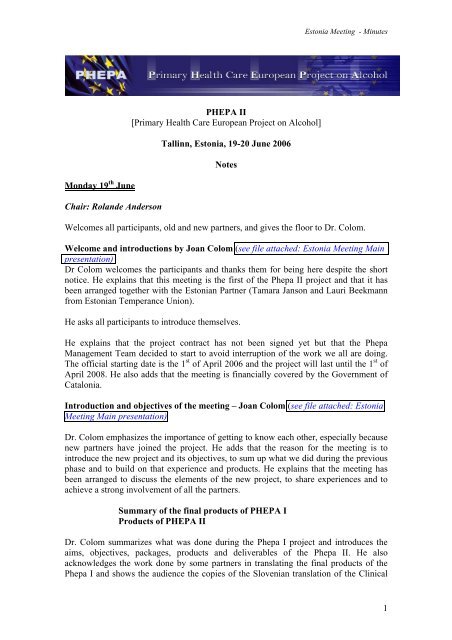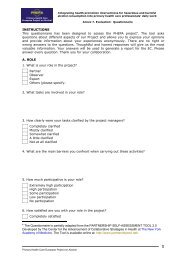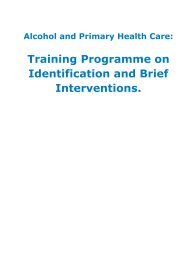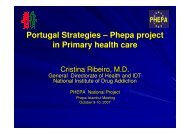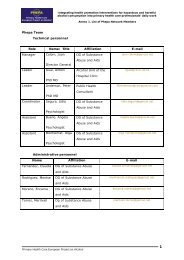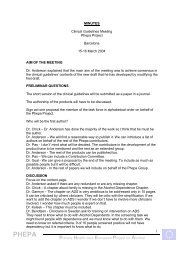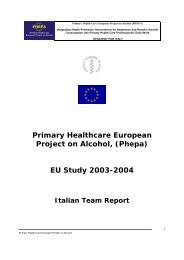Minutes of the Tallinn meeting - PHEPA
Minutes of the Tallinn meeting - PHEPA
Minutes of the Tallinn meeting - PHEPA
You also want an ePaper? Increase the reach of your titles
YUMPU automatically turns print PDFs into web optimized ePapers that Google loves.
Estonia Meeting - <strong>Minutes</strong><br />
Monday 19 th June<br />
Chair: Rolande Anderson<br />
<strong>PHEPA</strong> II<br />
[Primary Health Care European Project on Alcohol]<br />
<strong>Tallinn</strong>, Estonia, 19-20 June 2006<br />
Notes<br />
Welcomes all participants, old and new partners, and gives <strong>the</strong> floor to Dr. Colom.<br />
Welcome and introductions by Joan Colom (see file attached: Estonia Meeting Main<br />
presentation)<br />
Dr Colom welcomes <strong>the</strong> participants and thanks <strong>the</strong>m for being here despite <strong>the</strong> short<br />
notice. He explains that this <strong>meeting</strong> is <strong>the</strong> first <strong>of</strong> <strong>the</strong> Phepa II project and that it has<br />
been arranged toge<strong>the</strong>r with <strong>the</strong> Estonian Partner (Tamara Janson and Lauri Beekmann<br />
from Estonian Temperance Union).<br />
He asks all participants to introduce <strong>the</strong>mselves.<br />
He explains that <strong>the</strong> project contract has not been signed yet but that <strong>the</strong> Phepa<br />
Management Team decided to start to avoid interruption <strong>of</strong> <strong>the</strong> work we all are doing.<br />
The <strong>of</strong>ficial starting date is <strong>the</strong> 1 st <strong>of</strong> April 2006 and <strong>the</strong> project will last until <strong>the</strong> 1 st <strong>of</strong><br />
April 2008. He also adds that <strong>the</strong> <strong>meeting</strong> is financially covered by <strong>the</strong> Government <strong>of</strong><br />
Catalonia.<br />
Introduction and objectives <strong>of</strong> <strong>the</strong> <strong>meeting</strong> – Joan Colom (see file attached: Estonia<br />
Meeting Main presentation)<br />
Dr. Colom emphasizes <strong>the</strong> importance <strong>of</strong> getting to know each o<strong>the</strong>r, especially because<br />
new partners have joined <strong>the</strong> project. He adds that <strong>the</strong> reason for <strong>the</strong> <strong>meeting</strong> is to<br />
introduce <strong>the</strong> new project and its objectives, to sum up what we did during <strong>the</strong> previous<br />
phase and to build on that experience and products. He explains that <strong>the</strong> <strong>meeting</strong> has<br />
been arranged to discuss <strong>the</strong> elements <strong>of</strong> <strong>the</strong> new project, to share experiences and to<br />
achieve a strong involvement <strong>of</strong> all <strong>the</strong> partners.<br />
Summary <strong>of</strong> <strong>the</strong> final products <strong>of</strong> <strong>PHEPA</strong> I<br />
Products <strong>of</strong> <strong>PHEPA</strong> II<br />
Dr. Colom summarizes what was done during <strong>the</strong> Phepa I project and introduces <strong>the</strong><br />
aims, objectives, packages, products and deliverables <strong>of</strong> <strong>the</strong> Phepa II. He also<br />
acknowledges <strong>the</strong> work done by some partners in translating <strong>the</strong> final products <strong>of</strong> <strong>the</strong><br />
Phepa I and shows <strong>the</strong> audience <strong>the</strong> copies <strong>of</strong> <strong>the</strong> Slovenian translation <strong>of</strong> <strong>the</strong> Clinical<br />
1
Estonia Meeting - <strong>Minutes</strong><br />
Guidelines and Training Programme, acknowledging <strong>the</strong> work done by Dr. Marko<br />
Kolsek.<br />
Discussion:<br />
Dr. Pas mentions <strong>the</strong> importance <strong>of</strong> rolling out <strong>the</strong> products in every country and <strong>the</strong><br />
need to involve o<strong>the</strong>r associations and institutions. He also raises <strong>the</strong> question <strong>of</strong> <strong>the</strong><br />
amount <strong>of</strong> budget available. He also asks if <strong>the</strong> project is expecting <strong>the</strong> Belgian group to<br />
roll out <strong>the</strong> products in both Belgian Regions.<br />
Dr. Gual replies that <strong>the</strong>re is no commitment with <strong>the</strong> EC on that, this is a decision to be<br />
taken in each country.<br />
Dr. Spak asks about <strong>the</strong> use <strong>of</strong> rolling out <strong>the</strong> products in o<strong>the</strong>r settings.<br />
Dr. Gual answers that <strong>the</strong> products are focused 100% on PHC but Phepa II is open to<br />
start working in o<strong>the</strong>r settings. However <strong>the</strong>re is no obligation to do it since <strong>the</strong>re is still<br />
much to be done in PHC. He adds that in each country <strong>the</strong>re is a different situation and<br />
that Phepa II <strong>of</strong>fers <strong>the</strong> opportunity to learn <strong>of</strong> each o<strong>the</strong>r by sharing experiences.<br />
Administrative matters – Lidia Segura (see file attached: Estonia Meeting Main<br />
presentation)<br />
Lidia explains that she and Claudia are in charge <strong>of</strong> <strong>the</strong> administrative matters. She<br />
explains that <strong>the</strong> EC has not transferred yet <strong>the</strong> last payment <strong>of</strong> <strong>the</strong> Phepa I (30% <strong>of</strong> <strong>the</strong><br />
final costs incurred) despite <strong>the</strong> fact that <strong>the</strong> Final report was sent in October 2005. She<br />
mentions <strong>the</strong>n <strong>the</strong>re is a negative economical balance for <strong>the</strong> Catalan Government.<br />
She thanks all partners for <strong>the</strong>ir help during <strong>the</strong> sampling <strong>of</strong> <strong>the</strong> administrative<br />
documents <strong>of</strong> <strong>PHEPA</strong> II (Statutes, Attestation, VAT Nbr, Declaration <strong>of</strong> honour,<br />
Mandate letter, Legal Entity Form, etc.) and that all information was provided to <strong>the</strong><br />
EC.<br />
She mentions that a contract draft from <strong>the</strong> EC was received in December but that it has<br />
not been signed yet and explains that <strong>the</strong> budget figures have been calculated according<br />
to EC rules for each country and only associated partners will be reimbursed for <strong>the</strong>ir<br />
work.<br />
The project has two types <strong>of</strong> partners: 24 associated partners and 9 collaborating<br />
partners (6 countries and PREV-NET). Associated partners are subject to contract and<br />
are requested to work towards <strong>the</strong> project aims whereas collaborating partners are only<br />
requested to collaborate and participate as observers and all <strong>the</strong>ir contribution is<br />
voluntary.<br />
Both types <strong>of</strong> partners will be reimbursed for <strong>the</strong> travel and subsistence costs <strong>of</strong> <strong>the</strong>ir<br />
participation in <strong>meeting</strong>s and <strong>the</strong> reimbursement will always be done after <strong>the</strong> <strong>meeting</strong>.<br />
Brief presentations on <strong>the</strong> final products <strong>of</strong> <strong>PHEPA</strong> I (see file attached: Estonia<br />
Meeting Main presentation)<br />
Guidelines and recommendations – Antoni Gual<br />
Training manual – Antoni Gual<br />
Web and Internet site database – Lidia Segura<br />
Country reports – Lidia Segura<br />
Evaluation <strong>of</strong> <strong>the</strong> project – Lidia Segura<br />
2
Estonia Meeting - <strong>Minutes</strong><br />
All <strong>the</strong> products are introduced and when introducing <strong>the</strong> website www.Phepa.net Lidia<br />
requests partners to send <strong>the</strong> Phepa Management Team information about <strong>the</strong>ir activities<br />
and initiatives and that PMT will include it in <strong>the</strong> country pages. Lidia also announces<br />
that all <strong>the</strong> word files <strong>of</strong> <strong>the</strong> products and <strong>the</strong> cover layouts will be included in <strong>the</strong><br />
website in a restricted area (under a password).<br />
Experiences and lessons in implementing brief interventions<br />
Three case studies<br />
Catalonia – Antoni Gual (see file attached: Antoni Gual – Catalonia)<br />
England – Nick Hea<strong>the</strong>r (see file attached: Nick Heal<strong>the</strong>r – England)<br />
Finland – Kaija Seppä (see file attached: Kaija Seppä – Finland)<br />
Chair: Marko Kolsek<br />
Dr. Kolsek explains <strong>the</strong> afternoon agenda and that Dr. Anderson will go through <strong>the</strong><br />
deliverables <strong>of</strong> <strong>PHEPA</strong> II and how <strong>the</strong>y link with o<strong>the</strong>r activities.<br />
Introduction to <strong>PHEPA</strong> II Deliverables – Peter Anderson (see file attached: Peter<br />
Anderson - deliverables, link with o<strong>the</strong>r projects and feedback)<br />
European Platform <strong>of</strong> health pr<strong>of</strong>essionals and brief interventions<br />
Assessment tool and registry<br />
Web and Internet site database<br />
Roll out training programme<br />
Roll out clinical guidelines<br />
Development <strong>of</strong> toolkit and policy summary<br />
Support to municipal alcohol policy development<br />
Support to regional alcohol policy development<br />
Links with o<strong>the</strong>r projects<br />
Plans for Helsinki European alcohol Policy conference<br />
Dr. Anderson lists <strong>the</strong> deliverables <strong>of</strong> <strong>the</strong> Phepa II project and links <strong>the</strong>m with <strong>the</strong><br />
objectives <strong>of</strong> <strong>the</strong> proposed Building Capacity Project, a proposal put in strategically by<br />
<strong>the</strong> Slovenian Government, <strong>the</strong> first government <strong>of</strong> <strong>the</strong> new EU countries that will also<br />
have <strong>the</strong> European Presidency (2008).<br />
Group work to discuss elements <strong>of</strong> project<br />
Four groups to discuss partners’ needs and input to project<br />
Participants are divided in 4 groups:<br />
Group 1: Toni Gual, Daniela Alexieva, Rolande Anderson, Claudia Gandin, Sverre<br />
Barfod, Maciek Godycki-Cwirko, Joan Colom<br />
Group 2: Nick Hea<strong>the</strong>r, Lex Lemmers, Marko Kolsek, Thomas Hintz, Stefan Matula,<br />
Tamara Janson, Philippe Michaud<br />
3
Estonia Meeting - <strong>Minutes</strong><br />
Group 3: Panagiotis Panagiotidis, Leo Pas, Cristina Ribeiro, Kryszt<strong>of</strong> Pacholik, Egle<br />
Pinceviciute, Artur Mierzecki, Olga Montserrat<br />
Group 4: Pierluigi Struzzo, Lidia Segura, Sarmite Skaida, Frederik Spak, Kaija Seppä,<br />
Eleonora Sineger.<br />
Reflecting on <strong>the</strong> deliverables and links with o<strong>the</strong>r projects:<br />
1. What do you want from <strong>the</strong> project?<br />
2. What can you give to <strong>the</strong> project?<br />
3. What results should we expect at <strong>the</strong> country level<br />
Report <strong>of</strong> group work and discussion<br />
4
Estonia Meeting - <strong>Minutes</strong><br />
What do you want from <strong>the</strong> project? What can you give to <strong>the</strong> project? What results should we expect<br />
at <strong>the</strong> country level<br />
Group 4:<br />
Rapporteur:<br />
Kaija Seppä<br />
Group 3<br />
Rapporteur:<br />
Cristina<br />
Ribeiro<br />
-Involve o<strong>the</strong>r pr<strong>of</strong>essionals and contact<br />
politicians.<br />
-To share with o<strong>the</strong>r phepa members <strong>the</strong><br />
knowledge about implementation, barriers,<br />
how <strong>the</strong>y have solved <strong>the</strong> barriers.<br />
-Networking and contacts are very<br />
important. More collaboration inside Phepa<br />
Network, possibility to travel to o<strong>the</strong>r<br />
participant countries as experts<br />
-Interactive courses through websites and<br />
credits granted to those participants.<br />
-Country information on <strong>the</strong> website on how<br />
to approach patients, how to arrange <strong>the</strong><br />
trainings. Interactive teaching courses,<br />
possibility <strong>of</strong> circulating country info before<br />
<strong>the</strong> <strong>meeting</strong>s (like in <strong>the</strong> KBS).<br />
-More time for open conversations on<br />
important topics … we could have a mailing<br />
list or forum in <strong>the</strong> website<br />
Involve Phepa more in <strong>the</strong> community (not<br />
only GPS and alcohol specialists)<br />
-Policy on alcohol directed to PHC<br />
pr<strong>of</strong>essionals not only to specialists and<br />
more than education<br />
-How to motivate <strong>the</strong> GP<br />
-Networking on coordinating and who will<br />
- Focus on <strong>the</strong> issues<br />
- Work on National level as well as<br />
possible<br />
- Willing to be available for<br />
collaboration as experts<br />
- Willing to give expertise to GPs<br />
- Translate <strong>the</strong> whole products as<br />
adapted versions (not all<br />
members)<br />
- Link to national pages in native<br />
language<br />
- Serve as an expert group to assess<br />
countries that have younger history<br />
in SBI (through an internet<br />
database?)<br />
- Importance <strong>of</strong> detecting specific<br />
-Direct phepa to national<br />
guidelines<br />
-Expect more results than only <strong>the</strong><br />
number <strong>of</strong> pr<strong>of</strong>essionals being<br />
trained<br />
-Link phepa to community<br />
interventions<br />
-We have to have <strong>the</strong> political<br />
agreement<br />
-Get <strong>the</strong> consensus with <strong>the</strong> PHC<br />
pr<strong>of</strong>essionals …<br />
- Collaboration between<br />
Mental Health and PHC<br />
- Not only risky drinking but<br />
also risky behaviours (may be<br />
first, to focus later on alcohol<br />
5
Estonia Meeting - <strong>Minutes</strong><br />
be <strong>the</strong> task force in each country<br />
-exchange experiences, public<br />
communication and <strong>meeting</strong>s for specific<br />
groups<br />
-Know how to train <strong>the</strong> trainers and who<br />
must be <strong>the</strong> trainer …<br />
-We need to know more about evaluation …<br />
qualitative, quantitative … comparative<br />
measure between <strong>the</strong> countries …<br />
-Networking …linking societies …<br />
-Training <strong>the</strong> training development …<br />
medical education … e-learning …<br />
-Overcome <strong>the</strong> barriers … internet database<br />
will be a support …<br />
-Identify <strong>the</strong> most important targets …<br />
-Collaboration among <strong>the</strong> mental health<br />
pr<strong>of</strong>essionals and PHC<br />
-Specific expertise clearly identify and use<br />
it to exchange experiences … risky<br />
behaviors … if <strong>the</strong>y have more chances <strong>the</strong>y<br />
will buy our <strong>of</strong>fer … for instance more<br />
communication …<br />
-Some <strong>of</strong> <strong>the</strong> suggestions can be handled by<br />
INEBRIA too: research collaboration and<br />
expertise<br />
and tobacco)<br />
- INEBRIA as expertise<br />
network<br />
Group 2<br />
Rapporteur:<br />
Nick Hea<strong>the</strong>r<br />
- New countries & Older countries to<br />
share expectations (Knowledge, enforce,<br />
make simpler <strong>the</strong> information)<br />
- Brand new teams. Acquire <strong>the</strong> basic<br />
knowledge and disseminating strategies<br />
-Share knowledge and practical<br />
know how<br />
-Web site for GPs and nurses<br />
-How to use <strong>the</strong> experience in non<br />
medical settings (Dr. Matula,<br />
-To reinforce <strong>the</strong> strategy by<br />
many ways (updated guidelines)<br />
-Continue collaboration to<br />
reinforce <strong>the</strong> network<br />
-Solidarity<br />
6
Estonia Meeting - <strong>Minutes</strong><br />
- Continue <strong>the</strong> process <strong>of</strong> implementation Education Ministry, Pedagogues,<br />
Psychologists, Social Workers)<br />
-To gain better knowledge <strong>of</strong><br />
marketing strategies<br />
Group 1:<br />
Rapporteur:<br />
Rolande<br />
Anderson<br />
-Curriculum … what GP think about <strong>the</strong><br />
idea<br />
-Ways to motivate policy makers and what<br />
motivates GP …<br />
-Publication <strong>of</strong> experiences<br />
--Phepa II have to focus on what we can do<br />
to help <strong>the</strong> implementation, focus on health<br />
services, model <strong>of</strong> services and service level<br />
instead <strong>of</strong> <strong>the</strong> clinical level (European<br />
communication on alcohol)<br />
-Disseminate evaluation also<br />
outside PHC setting<br />
-Consolidation<br />
-Giving back <strong>the</strong> responsibility<br />
to PHC networks<br />
-Inviting parents groups and<br />
representatives from schools.<br />
7
Estonia Meeting - <strong>Minutes</strong><br />
Nick Hea<strong>the</strong>r says that <strong>the</strong> service model existing in each country is almost unique.<br />
Phepa I was a move to standardization and if at <strong>the</strong> end <strong>of</strong> <strong>the</strong> Phepa II, new countries<br />
have produced <strong>the</strong>ir own strategy that will be a considerable achievement. Phepa II will<br />
have to work also towards customization following <strong>the</strong> recommendations <strong>of</strong> <strong>the</strong> WHO<br />
collaborative project.<br />
Dr. Ribeiro talks about <strong>the</strong> common needs, barriers etc and <strong>the</strong> importance <strong>of</strong> countrybase<br />
cases presentations, not only evidence based presentations.<br />
Dr. Maciek Godicky-Cwirko also emphasizes that standardization is only possible in <strong>the</strong><br />
hard concepts and that we learn form o<strong>the</strong>r’s experiences and mistakes.<br />
Dr. Gual adds that <strong>PHEPA</strong> II has to clarify which essential elements have to be taken<br />
into account for EIBI dissemination. We should find <strong>the</strong> frame that optimizes<br />
dissemination.<br />
Dr. Spark suggests that dissemination experiences in <strong>the</strong> tobacco field can be also<br />
illustrative.<br />
Pr<strong>of</strong>. Nick Heal<strong>the</strong>r suggests that <strong>PHEPA</strong> II provide a brief intervention pack “Oven<br />
ready BI pack” piloted and customized in different countries as an additional element to<br />
complete <strong>the</strong> pack already produced.<br />
Dr. Maciek Godicky-Cwirko adds that we should work towards <strong>the</strong> inclusion <strong>of</strong> this<br />
trainings in <strong>the</strong> curriculum for health pr<strong>of</strong>essionals (standardized pr<strong>of</strong>essionals training<br />
program and vocational trainings) and to document how to do it.<br />
Dr. Cristina Ribeiro adds <strong>the</strong> importance <strong>of</strong> linking with o<strong>the</strong>r European Projects.<br />
Dr. Leo Pas proposes that <strong>the</strong> Phepa Management Team syn<strong>the</strong>size all <strong>the</strong> comments by<br />
<strong>the</strong> groups as a matter <strong>of</strong> reflection. Peter Anderson will provide <strong>the</strong> feedback on that.<br />
Tuesday 20 th June<br />
Chair: Leo Pas<br />
Results <strong>of</strong> <strong>the</strong> assessment tool by Peter Anderson (see file attached: Assessment tool)<br />
Dr. Anderson presents <strong>the</strong> results and emphasizes that surprisingly in ano<strong>the</strong>r project on<br />
tobacco <strong>the</strong> figure was different and he explains that <strong>the</strong> model was developed based on<br />
a review <strong>of</strong> <strong>the</strong> literature. He mentions that <strong>the</strong> results depend on <strong>the</strong> interpretation <strong>of</strong><br />
<strong>the</strong> questions and on who responds to <strong>the</strong> questions (government’s vs NGO).<br />
It should be worth while trying to pursue an assessment or measure <strong>of</strong> what is available<br />
at country level and it would be helpful at country level to make a change ra<strong>the</strong>r <strong>the</strong>n<br />
doing a cross comparison.<br />
Group work on updating <strong>the</strong> assessment tool<br />
8
Estonia Meeting - <strong>Minutes</strong><br />
Four groups to discuss assessment tool<br />
Reflecting on <strong>the</strong> assessment tool:<br />
1. What do we need <strong>the</strong> tool for?<br />
2. How should we update or complete <strong>the</strong> tool…<br />
3. How should we report on it?<br />
4. How should we document or store <strong>the</strong> tool (format/database, etc) …<br />
Report back from groups and general discussion<br />
Group 1 Rapporteur: Toni Gual<br />
• Need for baseline measurements, specially in new Phepa members<br />
• Need to compare (concerns on <strong>the</strong> political implications)<br />
• If we need to compare, <strong>the</strong>n we need:<br />
– Objective measurements<br />
– Detailed information. Specificity.<br />
– Who fills it<br />
– Accreditation procedure<br />
– Geographical differences taken into account<br />
• Peer review strategy needed<br />
• We should agree on <strong>the</strong> methodology (define standards):<br />
– Health authorities fill <strong>the</strong> Q<br />
– Peer review (Country based teams?)<br />
– Phepa experts<br />
• We should take responsibility for <strong>the</strong> results as Auditors or Accreditators<br />
Group 2 Rapporteur: Nick Hea<strong>the</strong>r<br />
• Useful for country level; have 2 or more people independently filling it in; <strong>the</strong>n<br />
bring toge<strong>the</strong>r and discuss differences<br />
• Very dubious and negative about international comparisons<br />
• Maps at best misleading, and potentially very dangerous<br />
• Core <strong>of</strong> problem is notion <strong>of</strong> scientism; not objective; Enormous work to go into<br />
objective measures<br />
• Could develop some scientific questions, which are also fraught with<br />
methodological problems<br />
• For internal audit, <strong>the</strong> instrument too long and too quantitative; now think about<br />
how to develop <strong>the</strong> instrument<br />
• Reporting within countries; could be held centrally<br />
• Can make some generalizations on country progress based on tool<br />
• Could be on Phepa website, but, in initial stages only to Phepa partners<br />
9
Estonia Meeting - <strong>Minutes</strong><br />
Group 3. Rapporteur: Leo Pas<br />
Aim<br />
To provide a valid baseline measure <strong>of</strong> <strong>the</strong> situation in <strong>the</strong> specific country and to<br />
provide description to indicate direction to develop facilities<br />
Target group<br />
Will be all instances who are involved in intersectorial policy development (on<br />
implementation <strong>of</strong> EIBI)<br />
Health minister,<br />
Focal point for drug, Social care Municipalities, PHC association<br />
Academic and scientific associations<br />
Methodology Define facilities<br />
& needs <strong>of</strong> facilities<br />
in <strong>the</strong> countries<br />
Collecting<br />
reflection<br />
questionnaire<br />
Distinguish qualitative/<br />
Quantitative<br />
Objective collection ?<br />
Who<br />
Coordinator Phepa Intersectorial team<br />
(Include PHC)<br />
Time table Phase I.<br />
October 06<br />
Working<br />
document,<br />
clarifications,<br />
changes, additions<br />
Phase II.<br />
December 06<br />
Adapted by<br />
Phepa<br />
Phase III.<br />
April-June 07<br />
Value issue<br />
(promote EIBI<br />
in PHC ) &<br />
define<br />
prioirities<br />
Phase IV<br />
Dec 2007<br />
Country overviews<br />
Discuss relevance in<br />
teams<br />
Group 4. Rapporteur: Pierluggi Struzzo<br />
• Differences in how questionnaire was filled in<br />
• Took formal paper that exists at national level to compare <strong>the</strong> results<br />
• Sometimes <strong>the</strong>re is a conflict between objective questions and comments added<br />
in <strong>the</strong> last questions<br />
• Tools are available fro comments to compare between countries<br />
• Specify a minimum requirement to answer <strong>the</strong> questions<br />
• Could send comments to modify questions<br />
• Could use it to monitor, to push for resources<br />
• Have a common publication on how things are done.<br />
• Include in <strong>the</strong> database for internal reasons<br />
10
Estonia Meeting - <strong>Minutes</strong><br />
Discussion<br />
Dr. Gual points out that it seems that <strong>the</strong>re is no agreement on <strong>the</strong> use <strong>of</strong> <strong>the</strong> tool. Some<br />
see <strong>the</strong> tool useful for cross comparisons and o<strong>the</strong>rs see it really negatively but taking<br />
into account that this is an European Project, we need maximum objectivity <strong>of</strong> <strong>the</strong><br />
measurement but European differences in <strong>the</strong> EIBI topic can be used at national level to<br />
help those countries that are behind to force <strong>the</strong>ir Governments to give <strong>the</strong>m more<br />
support.<br />
Dr. Hea<strong>the</strong>r suggests that using <strong>the</strong> tool for political purposes is fine but not for<br />
scientific purposes. The validity <strong>of</strong> <strong>the</strong> results is questionable and <strong>the</strong>y won’t be<br />
accepted in any international journal.<br />
Dr. Pas suggests working toge<strong>the</strong>r on <strong>the</strong> tool for internal use and debating on it until<br />
later decisions can be taken.<br />
Dr. Maciek Godicky-Cwirko also comments that it would be difficult to set standards to<br />
assess each topic. Protocols and standards have to be set to assess each area. The tool<br />
has not to look for standards in a general way but it can help to know if protocols are<br />
fulfilled at national levels.<br />
Dr. Ribeiro says that both are possible, <strong>the</strong> tool can be used to describe <strong>the</strong> situation and<br />
to help countries know <strong>the</strong> way to develop each area.<br />
It is agreed that <strong>the</strong> document will be used only internally until next <strong>meeting</strong> and that<br />
partners will be asked for additional suggestions on contents and process.<br />
Phepa team will send back <strong>the</strong> revised form (improved) with time enough before <strong>the</strong><br />
<strong>meeting</strong> that country teams can fill in <strong>the</strong> tool again. It is clear that <strong>the</strong> debate is on <strong>the</strong><br />
use for country comparisons but not at national level, so we continue with <strong>the</strong> idea <strong>of</strong><br />
going forward and a decision will have to be taken later.<br />
Presentation <strong>of</strong> report, Alcohol in Europe (see file attached: Alcohol in Europe)<br />
The 10 th recommendation talks about Advice for hazardous and harmful alcohol<br />
consumption and alcohol dependence, and recommendations for advice:<br />
10 th .1. Development <strong>of</strong> guidelines brief advice and implementation in different settings<br />
10 th .2. Training and support programmes to deliver brief advice<br />
10 th .3. Resources to ensure <strong>the</strong> widespread <strong>of</strong> identification and advice programmes.<br />
- Available in web site: www.ias.org.uk<br />
Dr. Hea<strong>the</strong>r says that it is a magnificent piece <strong>of</strong> work and that <strong>the</strong> report is going to be<br />
really useful for <strong>the</strong> group.<br />
Dr. Anderson says that <strong>the</strong> French translation will be available by <strong>the</strong> end <strong>of</strong> July at <strong>the</strong><br />
EC website and that <strong>the</strong> summary is already translated by all BTG partners in to <strong>the</strong><br />
different languages. He adds that <strong>the</strong> report was peer-reviewed by <strong>the</strong> Industry but<br />
received good comments.<br />
11
Estonia Meeting - <strong>Minutes</strong><br />
Dr. Pas discusses in <strong>the</strong> use <strong>of</strong> <strong>the</strong> data included for <strong>the</strong> Phepa project. It is said that<br />
25% is a realistic target with tangible benefits. This is a useful single piece <strong>of</strong> <strong>the</strong><br />
information.<br />
Dr. Peter Anderson mentions <strong>the</strong> launch <strong>of</strong> <strong>the</strong> Communication from <strong>the</strong> Commission to<br />
<strong>the</strong> Member States with recommendations in what have to be done from all parts.<br />
The insufficient evidence on education is also discussed. It does not mean that we do<br />
not have to do education but it is not an alternative to o<strong>the</strong>r policies. Education<br />
sensitizes population for policy measures (taxation has to be used but education helps to<br />
clarify to population why).<br />
Discussion <strong>of</strong> input to Helsinki conference – Peter Anderson (see file attached:<br />
Helsinki Conference)<br />
More information available at www.health.fi on registration fees and submission<br />
deadlines.<br />
Phepa project will look for additional budget to support <strong>the</strong> attendance <strong>of</strong> some partners.<br />
Decision has to be taken.<br />
Partners are invited to participate and specially proposing sessions on BI. Dr. Seppä<br />
likes to organize a session but says that more proposals are welcomed. Opportunity to<br />
promote BI may be in parallel sessions (working groups, training sessions…). Phepa<br />
project is going to propose a workshop following <strong>the</strong> experience in Warsaw, and Dr.<br />
Gual ask for partners interested in collaborate.<br />
Phase IV project will try to propose ano<strong>the</strong>r one specially if <strong>the</strong> report is already<br />
published by WHO. Nick will coordinate a session.<br />
Dr. Pas could present data on cost effectiveness.<br />
Inebria – Cristina Ribeiro (see file attached: inebria poster)<br />
Cristina Ribeiro invites partners to participate in <strong>the</strong> 3 rd Annual Conference <strong>of</strong> Inebria.<br />
More information available at: www.inebria.net<br />
Presentation on plans for database – Peter Anderson (see file attached: Database)<br />
General discussion<br />
Following <strong>the</strong> example <strong>of</strong> <strong>the</strong> www.treatobacco.net website that includes evidence on<br />
BI (implementation, cost-effectiveness, etc.) following <strong>the</strong> guidelines. We have <strong>the</strong><br />
opportunity to complete it during Phepa II modelling it according to this model.<br />
It is mentioned <strong>the</strong> need to work toge<strong>the</strong>r and develop it collectively.<br />
12
Estonia Meeting - <strong>Minutes</strong><br />
Phepa members will invite people to start working in groups. Phepa will organize <strong>the</strong><br />
information and will <strong>of</strong>fer out block areas available for volunteers.<br />
Dr. Ribeiro would like to help in developing one topic and Dr. Sparks says that he will<br />
share it with <strong>the</strong>ir group and respond on that in September.<br />
Dr. Michaud asks if <strong>the</strong> industry will be welcomed to support <strong>the</strong> translation <strong>of</strong> some <strong>of</strong><br />
<strong>the</strong> information in French.<br />
Dr. Gual replies that for <strong>the</strong> products, like in <strong>the</strong> Slovenian Translation, a solution has<br />
been found but <strong>the</strong> EC will be consulted for conditions.<br />
Next steps<br />
1. Maintain European Platform <strong>of</strong> health pr<strong>of</strong>essionals and brief interventions to<br />
encourage networking and sharing <strong>of</strong> experience, finding ways to do more <strong>of</strong><br />
this (country audit visits, more time during <strong>meeting</strong>s etc)<br />
2. Standardize, update and roll out training programme, perhaps developing<br />
minimum skills for providers, quality assessment criteria, and curricula for PHC<br />
teams, with tools for education; and Develop an intervention pack for PHC<br />
pr<strong>of</strong>essionals (like Drink less, NIAAA, WHO packs etc)<br />
3. Standardize, update and roll out clinical guidelines, perhaps developing<br />
minimum standards and quality assessment criteria<br />
4. Develop, provide and update <strong>the</strong> evidence base, making it available and<br />
accessible, perhaps through <strong>the</strong> Internet site database<br />
5. Continue to document examples <strong>of</strong> good practice, describing how it was done,<br />
providing case studies, perhaps through updated, revised and completed county<br />
reports – developing country stories<br />
6. Perhaps based on <strong>the</strong> assessment tool, describe <strong>the</strong> minimum requirements <strong>of</strong> a<br />
‘model service’.<br />
7. Through <strong>the</strong> assessment tool, document and monitor service provision<br />
8. Prepare a series <strong>of</strong> fact sheets aimed at policy makers: short 2-3 page state <strong>of</strong> <strong>the</strong><br />
art summaries on:<br />
-The why <strong>of</strong> brief interventions<br />
-Cost effectiveness <strong>of</strong> brief interventions<br />
-How to implement brief interventions<br />
9. Embed and link brief interventions into o<strong>the</strong>r relevant alcohol and primary care<br />
projects:<br />
-O<strong>the</strong>r EC funded projects (Pathways for Health, Building Capacity,<br />
if co-financed)<br />
-WHO initiatives<br />
-Primary care initiatives (Europrev, WONCA etc)<br />
-Conferences, e.g. Helsinki etc<br />
10. Embed brief interventions into alcohol policies and programmes at European,<br />
country, regional and municipal levels, also through social marketing, supported<br />
by advocacy training<br />
11. Support coalition building at country level, and consider extending BI in o<strong>the</strong>r<br />
settings (work place, A&E, and general hospitals.<br />
13
Estonia Meeting - <strong>Minutes</strong><br />
12. Build capacity <strong>of</strong> health care users, and assess hazardous drinking and changes<br />
through surveys etc.<br />
The estimated money available (final figures only when <strong>the</strong> EC provides <strong>the</strong> final<br />
contract) has to be dedicated to implement at least 2 <strong>meeting</strong>s and 2 trainings in<br />
each country.<br />
Country roll out – own contribution<br />
• Country based team <strong>meeting</strong> for 8 people<br />
– Travel: 1.200-1600 €<br />
– Per diem: 1.300 - 2.800 €<br />
– Room booking: 300-600 €<br />
• 2 trainings:<br />
– Trainer: 600 -1000 €<br />
Partners are requested to also provide an estimation <strong>of</strong> <strong>the</strong> costs <strong>the</strong>y will incur during<br />
<strong>the</strong> roll out.<br />
The Phepa Management Team will ask to Torker Ergüder, <strong>the</strong> Turkish partner from <strong>the</strong><br />
Ministry <strong>of</strong> Health to consider hosting <strong>the</strong> next <strong>meeting</strong> <strong>of</strong> <strong>the</strong> Phepa Project. The date<br />
has to be decided but most probably will be in <strong>the</strong> autumn.<br />
It is also planned to have Small Phepa Meetings:<br />
-The 3 rd Inebria Conference to be held in Lisbon (26 th -27 th October)<br />
-The Helsinki Conference<br />
-The 4 th Inebria Conference in Brussels.<br />
Phepa team will welcome ideas to prepare adequately <strong>the</strong> Phepa Workshop in Helsinki.<br />
Phepa team will send several e-mails:<br />
- explaining <strong>the</strong> plan for <strong>the</strong> development <strong>of</strong> <strong>the</strong> assessment tool and <strong>the</strong> idea is to have<br />
a better form by <strong>the</strong> end <strong>of</strong> <strong>the</strong> year.<br />
- proposing a new structure for <strong>the</strong> database and inviting partners to volunteer to work<br />
with it.<br />
- explaining what is feasible to be done at country level according to budget and<br />
partners will have to reply on <strong>the</strong>ir estimated costs.<br />
- asking for volunteers to develop <strong>the</strong> fact-sheets<br />
Dr. Seppä will coordinate <strong>the</strong> proposals on EIBI sessions in Helsinki.<br />
14


